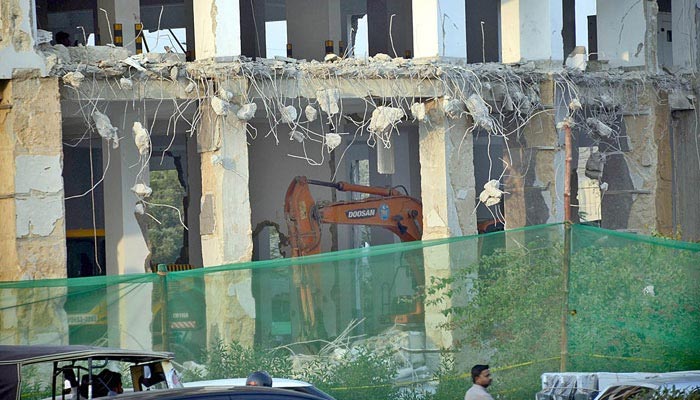Sindh govt eyes regularising illegal settlements through ordinance
Following Sindh governor's approval of draft ordinance, demolition works on illegal settlements will stop for 90 days
December 01, 2021

- If ordinance is approved, demolition works on illegal settlements will stop for 90 days.
- Ordinance's enactment will allow Sindh to set up commission to regularise illegal establishments.
- Commission will be empowered to take action against sponsors of illegal settlements.
KARACHI: The Sindh government on Wednesday prepared an ordinance to regularise illegal settlements and sent it to Governor Sindh Imran Ismail for ratification.
The Sindh government's move to relgularise illegal establishments comes after much hue and cry following the Supreme Court's order to demolish Karachi's Nasla Tower.
When the governor signs the ordinance, demolition works on illegal settlements will be stopped for a period of 90 days, according to the ordinance's draft.
"There shall be a moratorium or a temporary suspension on a demolition activity carried out by the relevant authority on the irregular construction/building for the period of ninety days after the commencement of this ordinance," reads the draft.
The promulgation will allow the government to form a commission — Sindh Commission for Regularization of Construction — to carry out the provisions of the ordinance.
A retired judge of the apex court or Sindh High Court will be the chairperson, and the secretary of Local Government and Housing Town Planning, Government of Sindh, its secretary.
The committee will have the following five members apart from the chairman and secretary:
- Minister, advisor, or special assistant to the chief minister for law;
- Chairman ABAD or a member nominated by him;
- An architect/town planner with at least 20 years of experience;
- An advocate or a legal expert with at least 20 years of experience in the applicable laws; and
- Any other member or professional from the public or private sector.
The chief minister will name the members of the committee within 15 days after the promulgation of the ordinance.
Commission's powers
- Take cognisance of any irregular construction on receipt of an application or through its own motion;
- Issue directions to a local government or the competent authority under the applicable laws for sustainable development of the area after taking into account the violation of planning standards in an irregular construction;
- Direct the local government or the competent authority on an application of a resident or owner in any unapproved construction to finalise long-pending applications and cases under applicable law within a stipulated period of time;
- Direct a local government or the competent authority or any other agency concerned to take punitive actions in accordance with the applicable laws including initiation of criminal proceedings under any other law against the sponsor for any illegality or violation of law which cannot be regularised under this ordinance or the sponsor fails to seek regularistion under this ordinance;
- Impose any penalty upon sponsors under this ordinance;
- Recommend disciplinary action including initiation of criminal proceedings against the officers and officials responsible for illegal or irregular construction and for non-compliance of the directions of the commission;
- Warn public at large in respect of any illegal or irregular construction through print and electronic media; and
- Recommend amendments in the applicable laws and the rules and/or regulations made thereunder.
Moreover, according to the draft, the commission will decide each application preferably not later than 60 days from the date of initiation of proceedings.
'Societies formed on agricultural land in Islamabad'
Administrator KMC, Sindh Government Spokesperson, and Advisor to CM on Law, Barrister Murtuza Wahab, said that the provincial government had decided to stop anti-encroachment operations across Sindh.
“The anti-encroachment operation from Karachi to Kashmore will be temporarily suspended. The Sindh government has prepared an ordinance to stop the anti-encroachment operation. A commission will be set up under the ordinance to determine which non-commercial structures must not be demolished,” he said, while addressing a news conference in Sindh Assembly.
Unfortunately, commercialisation took place in the last several months, he said, adding that it started from the regime of Naimatullah Khan as City Nazim. “When the citizens approached the courts against it (commercialisation), it was decided (by the court) that it is the prerogative of the city government,” he added.
Areas have been commercialised and the consequences are being felt today, Wahab said. “An underground system has not been created. This problem has spread all over Pakistan. Societies have been formed on agricultural land in Islamabad."
The spokesperson asked why, if Nasla Tower is being demolished, then the same not happening to Bani Gala.
He said PPP drafted the ordinance and sent it to the governor. “The Sindh governor will approve the draft of the ordinance,” he hoped, and added that the ordinance was made purely in the interest of the citizens.












